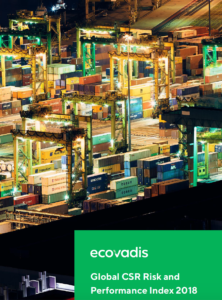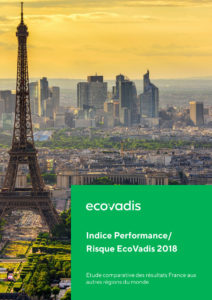
The following text was written by Eric Mugnier, Partner at EY Sustainable Performance & Transformation, France, and originally published in the “CSR Risk and Performance Index 2018.” With more than 90 consultants within the Sustainable Performance & Transformation team, dedicated entirely to sustainable development, EY France is an EcoVadis certified training partner.
The world today is facing social and environmental challenges with an awareness never seen before. The conventional wisdom in business has historically seen a necessary trade-off between economic efficiency and social and environmental performance. But because of this awareness, the way businesses are run has shifted with a more comprehensive and multi-dimensional understanding of value creation: Creating long-term social, environmental and civic value for business and communities.
Consumers are living their own revolution. Increasingly aware and demanding, they have the means to investigate before making a purchase and let the world know what they think — good or bad — in just a few clicks. Connected and distrustful toward brands, today’s consumers use mobile apps to compare products and ask peers about their experiences. They also want to know the story behind the product: Where and how was it manufactured? What is the impact on my health? Are the brands I’m using reflecting my own personal values? Are they genuine in their commitments and consistent in what they are their doing? The shopping cart has become a daily ballot!
At EY, we are convinced that building the brands of tomorrow will require companies to take four key steps:
- Commit to being part of the solution to the great challenges of our time;
- Deliver sustainable products and services supported by a responsible value chain,
- Engage customers and clients in dialogue and action,
- Communicate in a transparent and honest fashion.
Committing to Purpose
A sustainable brand is a brand committed to solving our society’s challenges, as stated by the United Nations with the 17 Sustainable Development Goals. The key will be linking the commitment with the brand’s real purpose. Unilever strives to “make everyday living sustainable,” and it works. Today, 70 percent of the company’s growth relies on the 26 committed brands — out of more than 400! Starbucks, with its core activity focused on friendliness and diversity, committed to hiring over 10 000 refugees over the next five years…. A direct response to Washington’s protectionist policy.
Delivering Sustainable Products and Services Supported by a Responsible Value Chain
Integrating environmental, social and societal criteria in product design and development will soon become a must-have to align the product portfolio with corporate purpose and CSR, consumer expectations and shareholder concern for resilience. Consumer needs are evolving, slowly but surely, and sustainable products are entering mainstream consumption. And this is a real revolution. Today, leading companies have already begun the transformation of their portfolio and are facing the challenge of measuring product sustainability, integrating it in existing processes and in their value chain in order to promote product performance to consumers and stakeholders. It’s a long term job that requires involving every layer of the organization.
Engaging Consumers and Stakeholders
New technologies and social networks have completely reconfigured interactions between companies, brands and stakeholders, and especially with consumers. Patagonia is a great example of a brand which successfully managed to involve consumers in the very core of the brand’s history, generation after generation. Beyond the consumer base, investors, clients, suppliers, local communities, regulators and NGOs are now considered as a very tangible eco-system a brand cannot afford to ignore and who can prove to being exceptional levers of innovation and opportunity!
Communicating With Honesty and Transparency
Stakeholders around the world are demanding for robust, trustworthy and comprehensive information on sustainability, from the HQ through the value chain. If challenges were too complex to tackle with the tools available just a few years ago, new technology is making transparency much easier. Companies and brands now have access to a wide selection of emerging tools and technologies to know their practices and impacts, all along the value chain and therefore communicate: real-time databases, blockchain traceability, QR codes on products, dedicated apps and software… secrecy and confidentiality are no longer go-to answers. Transparency is hardly risk-free and a real cultural leap for some, but it is becoming and irreversible standard to gain and maintain market trust.
Tomorrow’s brands will be sustainable or won’t be at all. Being sustainable is more than worthy words, it’s about changing the business and operating model to make a bigger difference and foster positive impact. We are convinced that only a genuine and in-depth transformation project will enable brands to gain and maintain a competitive advantage, rebuild trust and give the brand a real purpose. Time for action!
Check out the full CSR Risk and Performance Index report or the spotlight country report for France.
About the Author
Follow on Twitter Follow on Linkedin Visit Website More Content by EcoVadis EN



